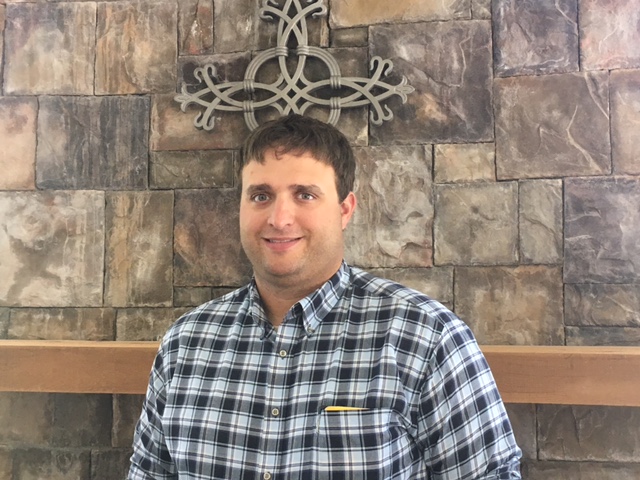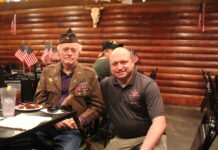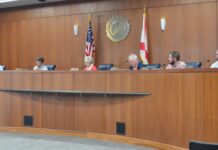CHS coach and science (and now history) teacher Kyle Morris / W.C. Mann
CULLMAN – On Monday morning, representatives of communities and organizations across north Alabama gathered at the Benedictine Sisters’ Retreat Center in Cullman to talk about how people and groups can participate in the “Alabama 200” state bicentennial celebration between 2017 and 2019. The celebration began in March with a commemoration of the naming of Alabama as a territory in 1817, and will conclude with the bicentennial of Alabama statehood in Dec. 2019.
Participants came from at least 12 north Alabama counties and numerous cities. Additionally, representatives were present from the Cullman County Historical Society, Southwest Cullman County Historical Society, Alabama State Historical Commission, Hanceville’s Historical Commission and Historical Preservation Board, Cullman Economic Development Agency and other organizations.
Connor Lowry, Alabama 200 communications and marketing manager, said, “We’re here to support and share events and ideas about our bicentennial. We have done workshops all across the state and have been excited to get to come back to Cullman, because they have such a strong committee already developed here. We’re hoping to have residents from all over this region to come and share ideas, and coordinate calendars, and talk about what’s going to be the plan for the next three years.”
Kyle Morris and the “Science of Alabama History”
Among more than 70 participants in the workshop were quite a few school teachers looking to enhance their existing state history curriculum offerings. One among them stood out as something a little different. Like most high school sports coaches, Cullman’s Kyle Morris has responsibilities in the classroom as well, but he’s not a history teacher. Morris has, at least until now, taught science.
“One of the things that has always plagued me,” said Morris, “is that kids don’t get a full picture of our state’s history in their curriculum from middle school through high school. They get a year of Alabama history in elementary school, but then the only thing they get in their history classes for the state of Alabama curriculum is George Wallace, Bull Connor, police dogs and the schoolhouse door- part of our history that we don’t have a lot of pride in.”
Morris does not discount the importance of the Alabama civil rights movement, but he wishes for his students to appreciate the full scope of the state’s history. From his background as a science teacher, he began looking at how the physical sciences of geology and geography, along with the mechanical science of technology, shaped the landscape of Alabama’s development. His curriculum is not specifically for the Alabama 200 celebration; in fact, he had already been working on it for a while when he first heard about the state’s bicentennial plans. He considers the timing to be a happy coincidence, though.
Morris continued, “I was talking with one of my fellow teachers a couple of years ago, Chassi Waddell, and she’s a history teacher. And I was like, ‘It’s amazing: Birmingham’s place in the history of the United States, and how the physical geography of Birmingham made it a city. It has no major waterway, like most cities; it’s where it is because of the location of iron ore, coke and coal, and limestone close by, with an intersection of the railroads. Birmingham became a hotbed of the civil rights movement, and that’s all students get now.’
“Chassi and I teamed up, and did a cross-curriculum lesson about the physical science of Birmingham, and how there’s more to the story. Then I started speaking with Mrs. (Kim) Hall (CHS principal) about it, and I said, ‘I’d like to do an Alabama history class.’ She said, ‘Well you need to do it through a scientific perspective.’ So I started working on a curriculum, and it just started rolling.
“You can relate so many things in Alabama back to the geography. Why did we have such a diverse Native American population? Because we have the most miles of navigable waterways of any state in the Union. And you could teach an entire course just on Birmingham. I’m going to teach about Muscle Shoals, and the acoustics and things that go along with having one of the most famous music studios in the world located right here in Alabama.
“Then we’ll turn our attention here to Cullman, and talk about the unique things that made Cullman great and still make it great. You can talk about Cullman is in its own little pocket of agricultural development throughout its years, and now it’s one of the industrial leaders of north Alabama. It’s in a great spot with the railroad close by, and you also have all the roads coming through. It’s in a unique place.”
For more information, or to become involved in Alabama 200, visit the Alabama Bicentennial Commission’s website www.alabama200.org.
Copyright 2017 Humble Roots, LLC. All Rights Reserved.



























